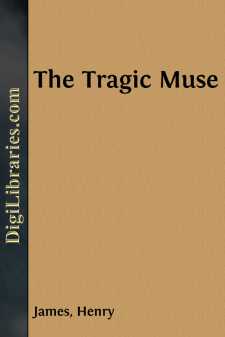Categories
- Antiques & Collectibles 13
- Architecture 36
- Art 48
- Bibles 22
- Biography & Autobiography 813
- Body, Mind & Spirit 142
- Business & Economics 28
- Children's Books 13
- Children's Fiction 10
- Computers 4
- Cooking 94
- Crafts & Hobbies 4
- Drama 346
- Education 46
- Family & Relationships 57
- Fiction 11828
- Games 19
- Gardening 17
- Health & Fitness 34
- History 1377
- House & Home 1
- Humor 147
- Juvenile Fiction 1873
- Juvenile Nonfiction 202
- Language Arts & Disciplines 88
- Law 16
- Literary Collections 686
- Literary Criticism 179
- Mathematics 13
- Medical 41
- Music 40
- Nature 179
- Non-Classifiable 1768
- Performing Arts 7
- Periodicals 1453
- Philosophy 64
- Photography 2
- Poetry 896
- Political Science 203
- Psychology 42
- Reference 154
- Religion 513
- Science 126
- Self-Help 84
- Social Science 81
- Sports & Recreation 34
- Study Aids 3
- Technology & Engineering 59
- Transportation 23
- Travel 463
- True Crime 29
Henry James
Henry James (1843-1916) was an American author known for his contributions to 19th-century literary realism and modernism. His works often explore themes of consciousness and perception, with notable novels including "The Portrait of a Lady," "The Turn of the Screw," and "The Wings of the Dove." James is celebrated for his intricate prose style and deep psychological insight into his characters.
Author's Books:
Sort by:
by:
Henry James
I Intending to sail for America in the early part of June, I determined to spend the interval of six weeks in England, to which country my mind's eye only had as yet been introduced. I had formed in Italy and France a resolute preference for old inns, considering that what they sometimes cost the ungratified body they repay the delighted mind. On my arrival in London, therefore, I lodged at a...
more...
by:
Henry James
CHAPTER I What determined the speech that startled him in the course of their encounter scarcely matters, being probably but some words spoken by himself quite without intentionвÐâspoken as they lingered and slowly moved together after their renewal of acquaintance. He had been conveyed by friends an hour or two before to the house at which she was staying; the party of visitors at the...
more...
by:
Henry James
Mrs. Gereth had said she would go with the rest to church, but suddenly it seemed to her that she should not be able to wait even till church-time for relief: breakfast, at Waterbath, was a punctual meal, and she had still nearly an hour on her hands. Knowing the church to be near, she prepared in her room for the little rural walk, and on her way down again, passing through corridors and observing...
more...
by:
Henry James
The first one took place in the country, at a little tea-party, one snowy night. It must have been some seventeen years ago. My friend Latouche, going to spend Christmas with his mother, had persuaded me to go with him, and the good lady had given in our honor the entertainment of which I speak. To me it was really entertaining; I had never been in the depths of New England at that season. It had been...
more...
by:
Henry James
I had done a few things and earned a few pence—I had perhaps even had time to begin to think I was finer than was perceived by the patronising; but when I take the little measure of my course (a fidgety habit, for it's none of the longest yet) I count my real start from the evening George Corvick, breathless and worried, came in to ask me a service. He had done more things than I, and earned...
more...
by:
Henry James
FROM MISS MIRANDA MOPE, IN PARIS, TO MRS. ABRAHAM C. MOPE, AT BANGOR, MAINE. September 5th, 1879. My dear mother—I have kept you posted as far as Tuesday week last, and, although my letter will not have reached you yet, I will begin another before my news accumulates too much. I am glad you show my letters round in the family, for I like them all to know what I am doing, and I can’t write to...
more...
by:
Henry James
I profess a certain vagueness of remembrance in respect to the origin and growth of The Tragic Muse, which appeared in the Atlantic Monthly again, beginning January 1889 and running on, inordinately, several months beyond its proper twelve. If it be ever of interest and profit to put one's finger on the productive germ of a work of art, and if in fact a lucid account of any such work involves that...
more...
by:
Henry James
"NO, my lord," Banks had replied, "no stranger has yet arrived. But I'll see if any one has come in—or who has." As he spoke, however, he observed Lady Sandgate's approach to the hall by the entrance giving upon the great terrace, and addressed her on her passing the threshold. "Lord John, my lady." With which, his duty majestically performed, he retired to the...
more...
by:
Henry James
A LONDON LIFE I It was raining, apparently, but she didn't mind—she would put on stout shoes and walk over to Plash. She was restless and so fidgety that it was a pain; there were strange voices that frightened her—they threw out the ugliest intimations—in the empty rooms at home. She would see old Mrs. Berrington, whom she liked because she was so simple, and old Lady Davenant, who was...
more...
by:
Henry James
BOOK FIRST. LADY JULIAISave when it happened to rain Vanderbank always walked home, but he usually took a hansom when the rain was moderate and adopted the preference of the philosopher when it was heavy. On this occasion he therefore recognised as the servant opened the door a congruity between the weather and the "four-wheeler" that, in the empty street, under the glazed radiance, waited and...
more...











